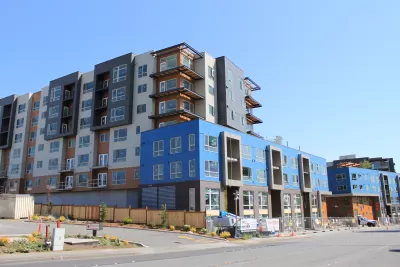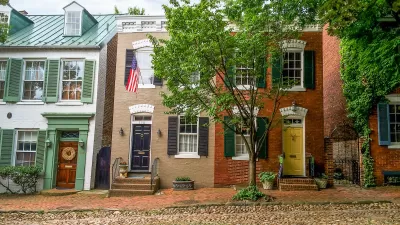Housing underproduction in the United States is growing more severe and more widespread.

The Up for Growth Housing Underproduction™ report for 2022 details the state of housing production in the United States, as well as “practical and tangible solutions” for advocates and policymakers.
According to the report, the nation is short 3.79 million housing units as of 2019, up from 1.65 million in 2012. The shortage is also growing more widespread: while 100 metropolitan areas experienced underproduction in 2012, that number was up to 169 metro areas in 2019. “The extent of underproduction varies from state to state: California has the largest deficit of homes at 980,000, while Mississippi is only short 1,000. Only Vermont saw an improvement.”
The factors impacting housing production are varied: “For example, in Detroit, underproduction is driven by uninhabitable units, while in Sacramento, a lack of housing is driving the shortage. In Washington DC, underproduction is fueled by a lack of household formation,” the report notes.
Even before the pandemic, areas that had not previously experienced housing shortages began to see a deficit. As an article by Emily Badger and Eve Washington in the New York Times puts it, “What once seemed a blue-state coastal problem has increasingly become a national one, with consequences for the quality of life of American families, the health of the national economy and the politics of housing construction.”
To help boost housing production, Up for Growth has developed “a policy framework that seeks to create more homes in areas with high economic mobility, access to jobs, and existing infrastructure” they call A Better Foundation. A Better Foundation “optimizes the distribution of these underproduced homes by prioritizing development in high-opportunity neighborhoods—places that are rich in jobs, transportation, infrastructure, and community assets—at a density scaled to fit into the existing neighborhood while increasing housing options.”
One major step is changing outdated zoning laws that don’t allow for flexibility in density and uses, mandate large lot sizes and parking, and prevent the construction of “missing middle” housing. The full report details the housing types recommended for different types of neighborhoods based on their existing density and strategies for improving equity and affordability.
FULL STORY: Housing Underproduction™ in the U.S. 2022

Planetizen Federal Action Tracker
A weekly monitor of how Trump’s orders and actions are impacting planners and planning in America.

DARTSpace Platform Streamlines Dallas TOD Application Process
The Dallas transit agency hopes a shorter permitting timeline will boost transit-oriented development around rail stations.

Congressman Proposes Bill to Rename DC Metro “Trump Train”
The Make Autorail Great Again Act would withhold federal funding to the system until the Washington Metropolitan Area Transit Authority (WMATA), rebrands as the Washington Metropolitan Authority for Greater Access (WMAGA).

Supreme Court Ruling in Pipeline Case Guts Federal Environmental Law
The decision limits the scope of a federal law that mandates extensive environmental impact reviews of energy, infrastructure, and transportation projects.

Texas State Bills to Defund Dallas Transit Die
DART would have seen a 30% service cut, $230M annual losses had the bills survived.

Bikeshare for the Win: Team Pedals to London Cricket Match, Beats Rivals Stuck in Traffic
While their opponents sat in gridlock, England's national cricket team hopped Lime bikes, riding to a 3-0 victory.
Urban Design for Planners 1: Software Tools
This six-course series explores essential urban design concepts using open source software and equips planners with the tools they need to participate fully in the urban design process.
Planning for Universal Design
Learn the tools for implementing Universal Design in planning regulations.
Roanoke Valley-Alleghany Regional Commission
City of Mt Shasta
City of Camden Redevelopment Agency
City of Astoria
Transportation Research & Education Center (TREC) at Portland State University
US High Speed Rail Association
City of Camden Redevelopment Agency
Municipality of Princeton (NJ)





























